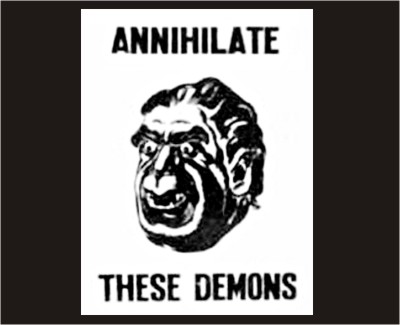
Inside
|
'Superior Responsibility':
The doctrine of 'command responsibility' or 'superior responsibility' was born neither as a detailed, nor a strictly defined, form of liability. It grew out of a 'fuzzy idea' and remained, for a long time, the subject of much debate and contradictory opinions. The doctrine of 'command responsibility' or 'superior responsibility' prescribes the criminal liability of those persons who, being in positions of command, have failed to either 'prevent' or 'punish' the crimes of their subordinates. This concept does not differentiate between military officers and civilians placed in positions of command since the duty to prevent and punish the offences of their subordinates in situations of armed conflict is considered to be incumbent upon both. Peter Von Hagenbach Trial was the first recorded trial in the world for the commission of war crimes. It was held in 1474 by an ad hoc tribunal of the Holy Roman Empire. According to many, the Peter Von Hagenbach Trial has set the stepping stone for the doctrine of command responsibility as it was regarded the first international recognition of superiors/commanders to act lawfully. In modern times, superior's duty to 'prevent and punish' is well recognised both in customary and treaty law as far back as the Leipzig Trials following World War I. At the end of World War I, the Treaty of Versailles ended the state of war between Germany and the Allied Powers. It was signed on June 28, 1919. The Treaty of Versailles, in its Articles 228 and 229, established the right of the Allied Powers to try and punish individuals responsible for 'violations of the laws and customs of war'. The other Central Powers on the German side of World War I were dealt with in separate treaties. These included the Treaty of Saint-Germain-en-Laye with Austria, the Treaty of Neuilly-sur-Seine with Bulgaria, the Treaty of Trianon with Hungary, the Treaty of Sèvres with the Ottoman Empire, etc. The Leipzig Trials involved the trial of German war criminals of the First World War, held in 1921 before the German Supreme Court, as part of the penalties imposed on the German government under the Treaty of Versailles. The phrase 'command responsibility' was first used in the Leipzig Trial of Captain Emil Muller, who was a German Army Captain and was responsible for the Flavy-le-Martel Prisoner of War Camp during World War I. The charges brought against Captain Muller following the end of the First World War included, inter alia, (1) failure to maintain a decent condition of the camp which had resulted in many deaths due to dysentery; (2) failure to prevent the commission of crimes and to punish the perpetrators thereof; and (3) infliction of physical violence towards the prisoners of the camp. The sentence imposed on Muller was only for a period of six months. After World War II, the famous Nuremberg Trials broadened the horizon of command responsibility in the context of international criminal law. The Nuremberg Trials were a series of military tribunals, held by the main victorious Allied forces of World War II. The trials involved the prosecution of prominent members of not only the military leadership, but also the political and economic leadership of the defeated Nazi Germany. The trials were held in the city of Nuremberg, Bavaria, Germany, in 1945-46, at the Palace of Justice. The first and best known of Nuremberg Trials was the trial of the major war criminals before the International Military Tribunal (IMT), which tried 24 of the most important captured leaders of Nazi Germany. It was held from November 20, 1945 to October 1, 1946. It must be mentioned that several of the most important war criminals of the war, such as, Hitler, Himmler and Goebbels, were not tried. This is due to the fact that they had committed suicide before the trials had begun. At the Nuremburg Trials, 24 of the most important captured leaders (military superiors) of Nazi Germany were tried by the International Military Tribunal of whom 12 received the death sentence. The second set of Nuremberg Trials of lesser war criminals was conducted under the Control Council Law No. 10 at the US Nuremberg Military Tribunals (NMT); among them included the Doctors' Trial and the Judges' Trial. The Doctors' Trial (officially United States of America v. Karl Brandt, et al.) was the first of 12 trials for war crimes that the United States authorities held in their occupation zone in Nuremberg, Germany after the end of World War II. These trials were held before U.S. military courts, not before the International Military Tribunal, but took place in the same rooms at the Palace of Justice. At the Doctors' Trial, 20 out of the 23 defendants were medical doctors (civilian superior) and all were accused of having been involved in Nazi human experimentation. Of the 23 (civilian superior) defendants, seven were acquitted and seven received death sentences; the remainder received prison sentences ranging from 10 years to life imprisonment. Similarly, the Judges' Trial (The United States of America v. Josef Altstötter, et al.) was the third of the abovementioned 12 trials. The defendants in this trial were 16 German jurists and lawyers (civilian superiors). They were tried, inter alia, for implementing and furthering the Nazi 'racial purity' programme through the eugenic and racial laws. Out of these 16 (civilian superior) defendants, 10 were found guilty -- of them, four received sentences for lifetime imprisonment, and the rest prison sentences of varying lengths. Four persons were acquitted of all charges. It must be mentioned that as civilian superiors, a number of industrialists did also receive jail sentences at various Nuremburg Trials (namely, Flick Trial, IG Farben Trial and Krupp Trial). The contemporary formulation of the doctrine of command or superior responsibility was established during the prosecution and trial of the Imperial Japanese Army General Tomoyuki Yamashita by a US Military Commission in Manila. From October 29 to December 7, 1945, an American military tribunal in Manila tried General Yamashita for the war crimes relating to the Manila Massacre (the February 1945 atrocities conducted against Filipino civilians in Manila, Philippines by Japanese troops during World War II) and many atrocities in the Philippines and Singapore against civilians and prisoners of war, such as the Sook Ching Massacre. (The Sook Ching Massacre was a systematic extermination of perceived hostile elements among the Chinese in Singapore by the Japanese military during the Japanese Occupation of Singapore, after the British colony surrendered on February 15, 1942 during the Second World War. The massacre was later extended to include Chinese Malayans as well. The massacre took place from February 18 to March 4, 1942 at various places in the region.) This Yamashita Trial has become a precedent regarding the command responsibility for war crimes and became to be known as the Yamashita Standard. For a long period, Yamashita Standard was thought to be directed against a military superior. However, we have seen in previous occasions that civilian superiors were found guilty for their breach of duty to 'prevent and punish' the acts or offences of their subordinates. It was with the advent of tribunals like International Criminal Tribunal for the Former Yugoslavia (ICTY) and the International Criminal Tribunal for Rwanda (ICTR) that we get to see a consistent practice of imposing liability on civilian superiors. As a matter of fact, the responsibility of civilian superiors in war crimes was only recognised very recently. The Celebici case was the first case before the ICTY where the question of superior responsibility for persons not shown to be part of the military chain of command had to be considered [Prosecutor v. Zejnil Delalic et al., Judgement (Celebici Trial Judgement), Case No. IT-96-21 -T, 16 November 1998]. The accused in the Celebici case acted as camp commander or worked in other functions at the Celebici prison camp. By the ICTY Appeals Chamber in Blaskic [Prosecutor vs. Tihomir Blaskic, ICTY (Appeals Chamber) March 3, 2000], three general elements of command responsibility (including civilian superior responsibility) were laid out. They are: (1) The existence of a superior-subordinate relationship between the accused as superior and the perpetrator of the crime as his subordinate; (2) the superior knew or had reason to know that the crime was about to be or had been committed; and (3) the superior failed to take the necessary and reasonable measures to prevent the criminal acts or punish the perpetrators thereof. To establish the existence of a superior-subordinate relationship, the ICTY, ICTR and other tribunals used the 'effective control test'. This test further assisted in finding out whether the civilian superior had 'the material ability to prevent and punish criminal conduct' [Prosecutor vs. Delalic, Mucic, Delic and Landzo, International Criminal Tribunal for the former Yugoslavia (Appeals Chamber) February 20, 2001]. It must be stated that the 'effective control test' is generally dependant on certain factual information, such as, the accused's official position, his or her capacity to issue orders, the procedure for appointment, the accused's position in the relevant power structure and the actual tasks that he or she has performed. At times, the civilian superior's de facto authority is also taken into account [Prosecutor v. Brima et al., Special Court for Sierra Leone (Trial Chamber) June 20, 2007]. It was in the case of the Prosecutor v. Kordic and Cerkez, a political leader (civilian) was for the first time found guilty of war crimes and crimes against humanity by the ICTY (Prosecutor v. Dario Kordic and Mario Cerkez, ICTY Judgment, Case No. IT-95-14/2-T, February 26, 2001). Kordic, one of the two accused in the case, had exercised considerable authority during the conflict in Bosnia and, contrary to the accused in earlier cases, he did not have a clear military position. Therefore, the case offers a formal beginning of the doctrine of superior responsibility with respect to civilian superiors. Similarly, before the ICTR, the requirements for the 'civilian or non-military' superior were laid out in Prosecutor v. Bagilishema case [Prosecutor v. Bagilishema, International Criminal Tribunal for Rwanda (Trial Chamber) June 7, 2001]. It was held in Prosecutor v. Bagilishema case that a civilian superior's degree of control must be 'similar to' that of a military commander, the control over subordinates must be 'effective' and the superior must have the 'material ability' to prevent and punish any offence. The contemporary formulation of superior responsibility is found in a plethora of international legal instruments, such as Article 7(3), the Statute of the ICTY; Article 6(3), the Statute of the ICTR; Article 28(2), the Statute of the International Criminal Court (ICC) and the Article 86 of the 1977 Protocol I additional to the Geneva Conventions.
'Liability for Crimes: Any commander or superior officer who orders, permits, acquiesces or participates in the commission of any of the crimes specified in section 3 or is connected with any plans and activities involving the commission of such crimes or who fails or omits to discharge his duty to maintain discipline, or to control or supervise the actions of the persons under his command or his subordinates, whereby such persons or subordinates or any of them commit any such crimes, or who fails to take necessary measures to prevent the commission of such crimes, is guilty of such crimes.' Many argue that section 4 of the 1973 Act only provides for military commanders and superiors to be held responsible for criminal conduct of subordinates; and it does not provide for civilian superiors to be held similarly accountable. It must be mentioned that the 2009 International Crimes (Tribunals) (Amendment) Act, by its amendments to section 3 of the 1973 Act, now extends the tribunal's jurisdiction to civilian as well as military commanders. As per the amended section 3, tribunal now has jurisdiction to try and punish any non-military person, whether superior or subordinate, who has direct or indirect involvement with the relevant crimes. In other words, the tribunal now has jurisdiction to try any accused non-military person, including a civilian superior. In this mosaic, it is stated that section 4 of the 1973 Act generally asserts the superior liability for crimes. The above section uses the terms commander or superior officer in general. It does not specify whether the said section would only refer to military commanders and/or military superiors. In other words, the said section does not preclude the liability of the civilian superiors. If the amended section 3 and the section 4 of the 1973 Act are read together it would affirm that liability for crimes under section 4 would also entail the liability of the civilian superior. It is further argued that the texts of the 1973 Act under section 4 should be interpreted literally.
Recently a claim has been made, that the above definition of superior responsibility under the 1973 Act is not entirely consistent with the definition adopted in more recent statutes of the international law. According to many, the above definition does not contain any reference to the 'mental element' of superior responsibility as is found in the definition of superior responsibility under Article 28 of the Rome Statute of the International Criminal Court, 1998. Hence, many suggest amendment to section 4 of the 1973 Act to include the words knew or should have known in the definition of superior responsibility. It is conceded that to establish superior responsibility under Article 28 of the Rome Statute of the International Criminal Court, 1998, one of the important elements, inter alia, is to prove that the accused superior either knew or should have known that the subordinates were committing or about to commit relevant offences. Article 28, Rome Statute of the International Criminal Court, 1998 reads as: 'A military commander or person … shall be criminally responsible for crimes … committed by forces under his or her effective command and control, or effective authority and control … as a result of his or her failure to exercise control properly over such forces, where: (i) That military commander or person either knew or, owing to the circumstances at the time, should have known that the forces were committing or about to commit such crimes …' It is further conceded that no such element is made a requirement to establish superior responsibility under section 4(2) of the 1973 Act. However, it is stated that the extent of superior responsibility is wider under the 1973 Act than that of under Article 28 of the Rome Statute of the International Criminal Court, 1998. In essence, to establish superior responsibility under the 1973 Act the prosecution needs not prove that the accused superior either had any 'actual knowledge' (knew) or 'constructive knowledge' (should have known) about commission of the subordinate's crime. In other words, under the 1973 Act, a superior is always responsible for the activities of his subordinates, whether he had any kind of knowledge or not. On the contrary, under the Rome Statute of the International Criminal Court, 1998 a superior is made liable for his subordinate's crimes, only when he had either actual or constructive knowledge of the same. It is argued that such difference in the state of knowledge would not prejudice any trial under the 1973 Act. Necessary protection is given to the accused person (including superiors) regarding his extent of involvement in an offence. In this regard section 20 of the 1973 Act can be referred: Tureen Afroz is an Associate Professor at the School of Law, BRAC University, the (Honorary) Executive Director of LawDev (Bangladesh) and the General Secretary of the the Antorjatik Aporadh Tribunal Dhaka Shohayok Mancha. The cartoons used in this article are by Shishir Bhattacharjee, courtesy, Ekattorer Ghatok Dalal Nirmul Committee.
|



 In Bangladesh, the relevant legal provision for the superior responsibility can be found at Section 4(2), International Crimes (Tribunals) Act, 1973 (as amended in 2009). Section 4(2) reads as follows:
In Bangladesh, the relevant legal provision for the superior responsibility can be found at Section 4(2), International Crimes (Tribunals) Act, 1973 (as amended in 2009). Section 4(2) reads as follows: In plain English literature, commander means one who can command and superior officer means senior officers. Both these posts can be found in the military as well as non-military or civilian strata and as such, criminal liability under section 4 can be applicable for both military and civilian superiors.
In plain English literature, commander means one who can command and superior officer means senior officers. Both these posts can be found in the military as well as non-military or civilian strata and as such, criminal liability under section 4 can be applicable for both military and civilian superiors.